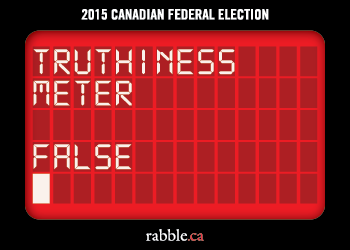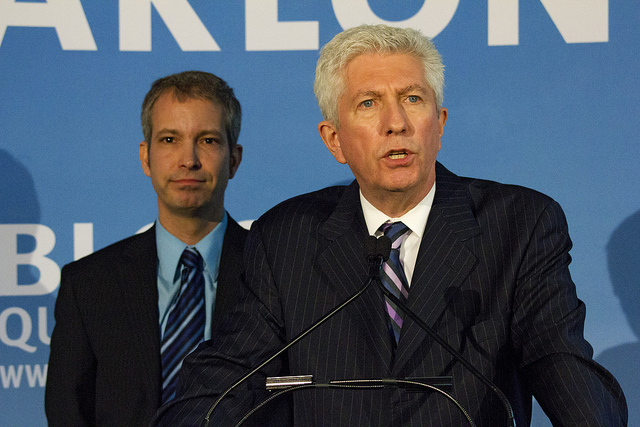Want to see an election campaign fact rich and spin poor? Chip in to keep our fact check blog up to date.
The claim: the Bloc Québécois says that Quebec progressives can’t support the NDP because they support pipelines. Is this true?
The Bloc has tried to position themselves as the only real option for progressive Quebecers who oppose pipelines. This past week, the Bloc released an ad that painted the NDP as being pro-pipelines and pro-Niqab, where a pipeline cartoon morphed into the face of a woman, covered by a veil. NDP spokesperson Karl Bélanger asked if the Bloc had been seeking advice from France’s far right-wing party the National Front.
“The bloc canadien (the Liberals, Conservatives and the NPD) support the project, regardless of Quebecers’ opposition. The bloc canadien choose oil from the West while the Bloc Québécois chooses the rivers of Quebec,” said Gilles Duceppe in Le Devoir last June.
At the start of the election, Duceppe challenged Tom Mulcair to clearly state his party’s position on pipelines. He argued that Mulcair had been saying different things in French and English about the NDP’s position on pipelines to try and confuse voters and their position.
How different are the two positions?
First, it’s critical to examine the Bloc’s commitment to the environment through the lens of an independent Quebec. They believe that Quebecers need to be in control of their resources, rather than having Ottawa decide what is exploited and how.
This means that while the Bloc is opposed to pipelines (and in particular Energy East, as it runs through Quebec), their primary contention is that the program doesn’t have the approval of Quebec’s Bureau d’audiences publiques sur l’environnement (BAPE).
The NDP essentially has the same position. At a campaign stop in Québec City, Mulcair said that the NDP would only support Energy East if there was a strong environmental assessment, and that Harper’s environmental assessments aren’t good enough. Last week, the National Observer profiled Mulcair’s pipelines position essentially saying the same thing, in English.
Mulcair was the Minister of the Environment when he was a Quebec Liberal and governed under a regime that included the BAPE as part of public consultations.
Both parties are playing politics and neither position on pipelines should be good enough for anti-pipeline activists. But the Bloc’s characterization that they’re more progressive than the NDP, especially on pipelines, isn’t exactly true. Indeed, a look at the responses from the candidates in the riding of Terrebonne (the Liberals included) demonstrates just how close the Bloc, the NDP and the Liberals really are on the question of Energy East.
Very little attention has been paid to the fact that as the election drags on, the National Energy Board is continuing its work to approve Energy East and the Line 9B reversal projects. Municipal consultations are being held in Montreal and recommendations will be submitted to the BAPE and the NEB.
The real question is which party has the best odds to intervene in the consultations immediately after forming Canada’s next government?
Verdict:

Want to see an election campaign fact rich and spin poor? Chip in to keep our fact check blog up to date.



